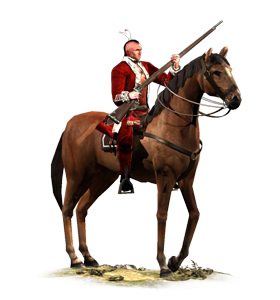Difference between revisions of "Mounted Tribal Auxiliary (ETW Unit)"
| Line 25: | Line 25: | ||
In the early days of European settlement, the Native Americans were happy to work with the various foreign powers that colonized America, even forming alliances against their neighbours and other Europeans. The tribes soon became involved in trade, fought wars because of the allegiances they forged, and were forced into new alliances as old tribal enemies took up with Europeans. | In the early days of European settlement, the Native Americans were happy to work with the various foreign powers that colonized America, even forming alliances against their neighbours and other Europeans. The tribes soon became involved in trade, fought wars because of the allegiances they forged, and were forced into new alliances as old tribal enemies took up with Europeans. | ||
==Details== | ==Details== | ||
| − | The Native American missile cavalry of choice for Colonial powers, they are slightly superior to Mounted Tribal Gunners although they are | + | The Native American missile cavalry of choice for Colonial powers, they are slightly superior to Mounted Tribal Gunners although they are more expensive. They may not compare very favourably to Dragoons in a straight up fight yet in their home territory they can fare better. They are rarely worth the time to recruit them though, European ranged cavalry provided much greater firepower and are not as helpless in melee. |
==Factions== | ==Factions== | ||
| − | |||
| − | |||
{{List Column|3| | {{List Column|3| | ||
*[[Image:Britain_flag.jpg|25px]] [[Great Britain (ETW Faction)|Great Britain]] | *[[Image:Britain_flag.jpg|25px]] [[Great Britain (ETW Faction)|Great Britain]] | ||
Revision as of 16:11, 21 January 2013
![]() These tribesmen are willing to fight for European gold, and a musket apiece.
These tribesmen are willing to fight for European gold, and a musket apiece.
Overview
A musket is a status symbol among the tribes, even though it is not as useful in a fight as an old-fashioned and reliable bow. It is, however, a mark of personal bravery that a warrior has taken one in battle, or been considered worthy enough to have been given one of the precious weapons. These men are the most irregular of forces, unwilling to take formal army discipline, yet willing to fight like men possessed when the need arises.
In the early days of European settlement, the Native Americans were happy to work with the various foreign powers that colonized America, even forming alliances against their neighbours and other Europeans. The tribes soon became involved in trade, fought wars because of the allegiances they forged, and were forced into new alliances as old tribal enemies took up with Europeans.
Details
The Native American missile cavalry of choice for Colonial powers, they are slightly superior to Mounted Tribal Gunners although they are more expensive. They may not compare very favourably to Dragoons in a straight up fight yet in their home territory they can fare better. They are rarely worth the time to recruit them though, European ranged cavalry provided much greater firepower and are not as helpless in melee.
Factions
 Great Britain
Great Britain United Provinces
United Provinces Austria
Austria Bavaria
Bavaria Gran Colombia
Gran Colombia Courland
Courland Denmark
Denmark France
France Genoa
Genoa Georgia
Georgia Greece
Greece Hannover
Hannover Hessen
Hessen Hungary
Hungary Ireland
Ireland Knights of St. John
Knights of St. John Louisiana
Louisiana Maratha Confederacy
Maratha Confederacy Mexico
Mexico Naples & Sicily
Naples & Sicily New Spain
New Spain Norway
Norway Italian States
Italian States Savoy
Savoy Poland-Lithuania
Poland-Lithuania Portugal
Portugal Prussia
Prussia Russia
Russia Quebec
Quebec Saxony
Saxony Scotland
Scotland Spain
Spain Sweden
Sweden Thirteen Colonies
Thirteen Colonies United States
United States Venice
Venice Westphalia
Westphalia Württemberg
Württemberg
